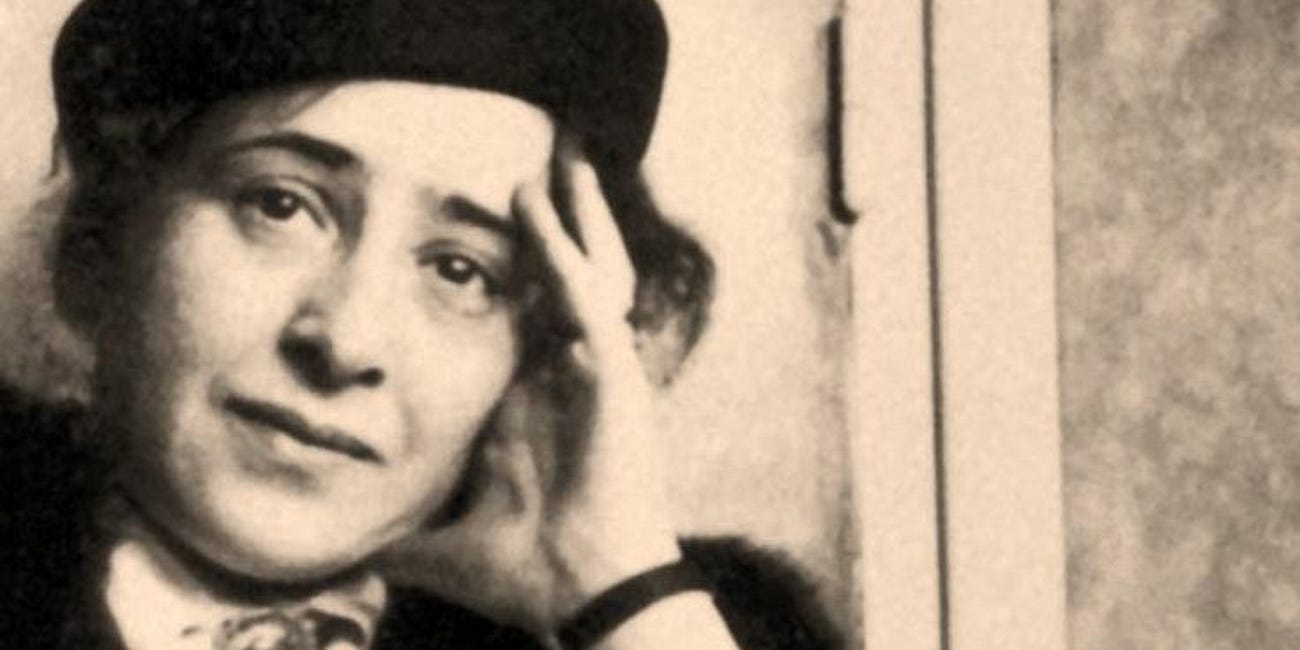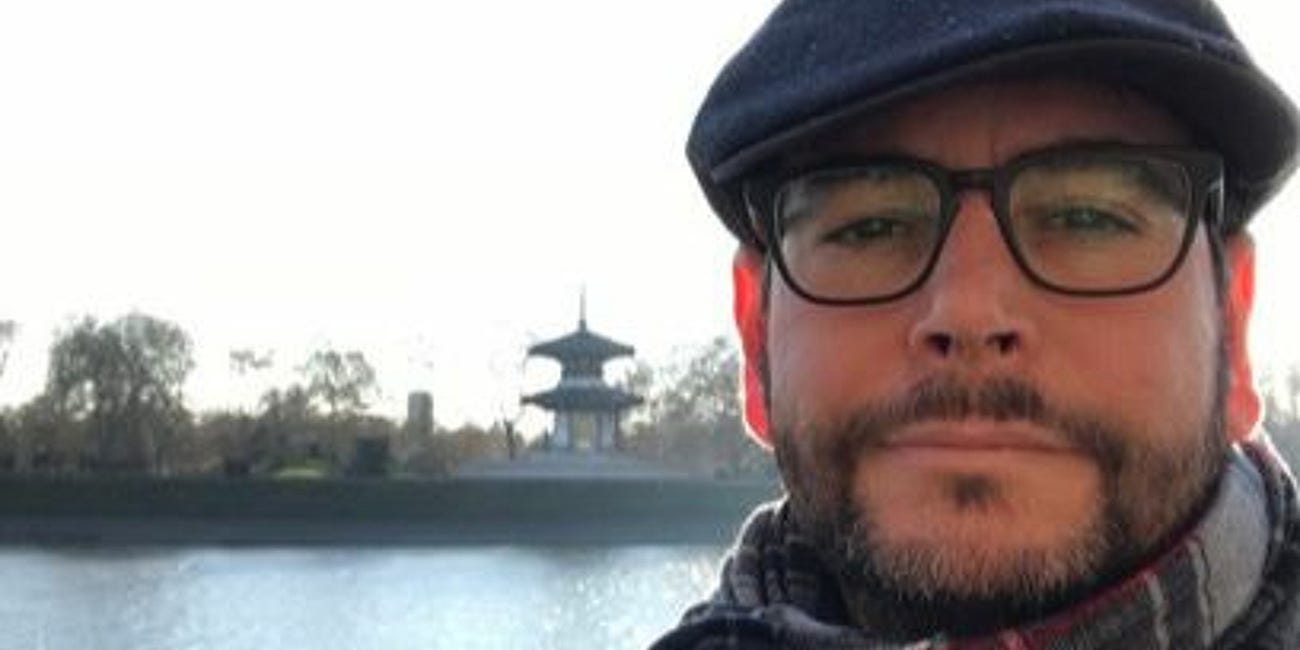As this New Year arrives, perhaps you too find the world getting stranger, more uncanny. How do we get our bearings if we hope to engage with all that’s going on around us?
I find myself trying to look ahead by looking back—to certain earlier writers and thinkers who (like Dante’s Virgil) can lead us with wisdom and patience across a burning landscape, still metaphorical but only just.
Lately I’ve been trying to think with three figures in particular—two older, one contemporary—whose ideas I find work for me like a kind of mental walkway across the current inferno.
Over the next three weeks, I want to share what I’ve learned from each of these three, beginning this week with Hannah Arendt, the German-Jewish political theorist who died in 1975. (I’ll wait to name the other two here.)
Let me begin by noting why Arendt is on my list. Putting it as plainly as possible, this brilliant refugee from Nazism described (in 1951!) the rise of a kind of meta-politics which we are enduring today in this country’s Trumpism and similar movements elsewhere. The ultimate cause, as she suggests in the final pages of her Origins of Totalitarianism? Our shared mass condition, much in the news lately, of loneliness:
What prepares men for totalitarian domination in the non-totalitarian world is the fact that loneliness, once a borderline experience usually suffered in certain marginal social conditions like old age, has become an everyday experience of the ever-growing masses of our century.
This widespread condition of non-membership (she also refers to rootlessness and homelessness) is where the dismantling of our social world has brought us. Arendt would tell us it has all happened before, in the years when she witnessed the appeal of grand world-historical theories-of-everything like that offered by Nazism (race as they key) and Bolshevism (class as the key). For millions suffering from this kind of world-alienation, these ideas give them a sense of meaning, even something close to salvation from their sense of anomie.
As mostly a cult of personality to this point, Trumpism does not qualify as a world-historical theory. But our concern should be with its ideological proximity to any such ideas, with “Replacement Theory” possibly offering the most dangerous, totalizing potential.
If Arendt’s prescience about much of today’s political crisis were not enough, she was also an unwavering Cassandra in her warnings on another very topical issue: the fate of the state of Israel. Her Eichmann in Jerusalem (1963) is a book-length report for the New Yorker on the trial of Adolph Eichmann after his kidnapping and extradition from Argentina by Israel’s Massad agency.
A personal note: I read this book as an undergraduate in the 1960s, long before the Holocaust became a topic in school. Being little prepared for the experience, I was stunned by two things as I read. First, the scale of this enormity which, as I learned with increasing incredulity, no one—no army, no state power—had managed to prevent or even forestall.
The second impression was the extraordinary balance in Arendt’s tone as she narrated this nightmare of history, with a mix of what seemed like impossible objectivity undercut by a stream of irony. I felt I was hearing the very voice of justice itself speaking here, and—perhaps unsurprisingly—it was a Jewish voice.
The Eichmann book was released to some acclaim but that was overshadowed by the public outbursts of indignation from Jewish leaders and intellectuals, among them several of Arendt’s longtime Jewish friends and colleagues.
Her great sin, according to her detractors, might be summarized as a failure to have taken sides strongly enough, both on behalf of the Israeli government and the world Jewish community as a whole.
Then there was her single-minded devotion to journalistic truth which went uncomfortably far in discussing the degree of cooperation between Nazi officials and some leaders of the Jewish community councils—none of which was unknown history at the time.
She also records her surprise at discovering Eichmann not to be the embodiment of demonic anti-Semitism but more like a numbingly ordinary bureaucrat, “just following orders,” as he frequently insisted. (As an example of his effectiveness in carrying out orders, we might note the organizing of the transport to Auschwitz of 437,000 of Hungary’s 725,00 Jews, for example.)
Her phrase describing her reaction to Eichmann—she found him an example of “the banality of evil”—encapsulated the best-known takeaway from her book, a refusal to grant human evil any kind of inhuman glamour. (Later evidence has revealed, however, that Eichmann was much more zealous about his deadly career and his anti-Semitism than Arendt supposed.)
Her phrase about the nature of evil also helped undermine a key pillar of what was nonetheless to become “Holocaust theology” in the next few years—the thesis that the Holocaust was a unique event, perpetrated by a regime which was indeed radically evil. Many in the Jewish community felt that if the events could not be seen in that extreme, almost theological light, the task of arguing for Israeli exceptionalism and policies of survival-at-any-cost would be made more difficult.
Arendt also criticized Eichmann’s process as a show trial arranged by Prime Minister Ben-Gurion for certain political reasons. The latter meant the trial was less to adjudicate what Eichmann had done than to use the occasion to publicize what the Jews had suffered in the Holocaust.
This penchant for truth-telling under the most difficult circumstances was not some quixotic personality trait in Arendt. It partly came from her fixed conviction that all governments lie and some lie more than others.
It was also a heroic attempt, given the tormented nature of the occasion, to inject a balanced sense of judgment into matters around which all parties felt they had no choice but to choose sides. As Arendt argued frequently throughout her career, when this kind of ideological pressure permeates the air, all thinking stops.
This history also helps us understand what’s behind a well-known comment of hers: “There are no dangerous thoughts. Thinking itself is dangerous.”
What then might Arendt advise us to do in these times in addition to becoming stronger, more engaged citizens?
Learn to organize a local citizen’s assembly by taking the free online course Democratic Innovation and Citizen Lotteries (created by the Hannah Arendt Center’s Democracy Innovation Lab);
Participate in the Virtual Reading Group of the Hannah Arendt Center in order to dive deep into Arendt’s thought and work. Requires a paid membership (basic is $100) with different levels available, including student ($25) and senior ($50). Here’s an intro the group.
I’ll end here by noting I read Arendt not only to learn what she knew: I read her in hopes of learning to think as she thought.
A few podcast links of possible interest, from our Dorothy’s Place archive:
Episode #14: Samantha Hill on Hannah Arendt's Relevance at this moment
The election of Donald Trump in 2016 brought new readers to Hannah Arendt's Origins of Totalitarianism (published in 1951). Pete and I talk to Samantha Hill, assistant director of Bard College's Arendt Center for Politics and the Humanities, about the insights Arendt's thought offers us today.
Episode #31: Josh Corey on Arendt, Heidegger, Poetry and the Novel
A conversation with our first creative writer on the podcast, Evanston-based Joshua Corey, a poet, novelist, translator and critic. We talk about his remarkable longform poem, Hannah and the Master (a kind of dreamscape reflection on the intertwined lives of Hannah Arendt, Martin Heidegger, Simone Weil and other figures) and his new novel, How Long Is N…
See you next time—peace.






Thanks for your thoughts on Pope Francis. I appreciate you "getting" his message from the "peripheries." Too much of the 'first world' media, I fear are going to pass over that too quickly.
When listening to your discussions about Illich, it struck me why I became enthralled with Pier Paolo Pasolini's life (https://en.wikipedia.org/wiki/Pier_Paolo_Pasolini). Their views on education and language were similar but distinct. Pasolini was equally as heretical but did not have the same support structure as Illich and met a fateful death at an early age.